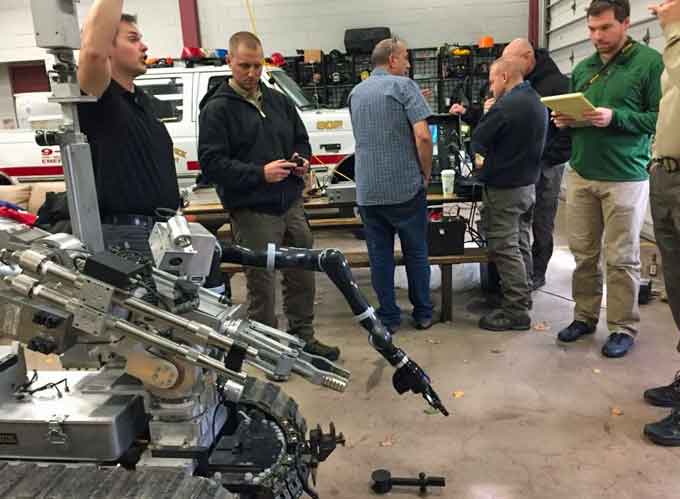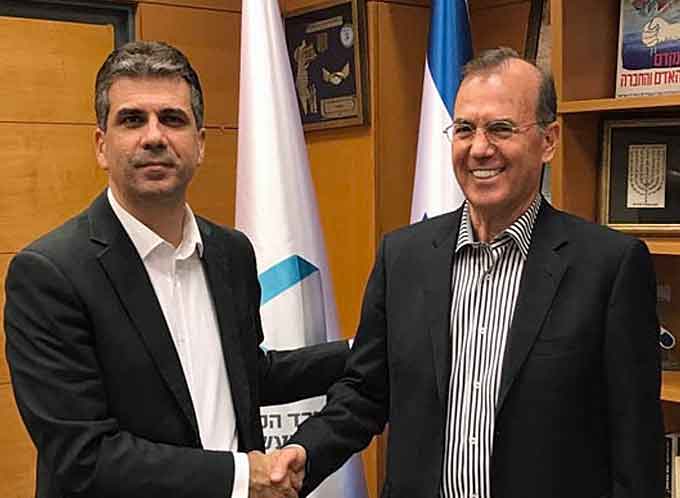
International cooperation in science, technology, and innovation promotes security, prevents and reduces risks of manmade and natural hazards, and enhances resilience.
 As the research and development (R&D) arm of the Department of Homeland Security (DHS), the Science and Technology Directorate (S&T) understands the importance of global cooperation and engages with its international partners to enhance homeland security capabilities.
As the research and development (R&D) arm of the Department of Homeland Security (DHS), the Science and Technology Directorate (S&T) understands the importance of global cooperation and engages with its international partners to enhance homeland security capabilities.
Through its International Cooperative Programs Office (ICPO), S&T maintains valuable partnerships with a number of nations.
Among these international partners, Israel stands out due to a rich research and development collaboration portfolio with S&T.
The U.S. and Israel began their annual bilateral meetings in 2008.
Through the following five working groups under various S&T components, S&T and Israel’s Minister of Public Safety (MOPS) have collaborated on numerous projects to benefit public security:
- DHS S&T First Responders Group (FRG)
- DHS S&T Cyber Security Division
- DHS S&T Borders and Maritime Security Division
- DHS S&T Chemical and Biological Defense Division, and the
- DHS S&T Explosives Division
-
AST in pleased to acknowledge the DHS S&T First Responders Group (FRG) as a 2017 ‘ASTORS’ Homeland Security Award Winner
- In total DHS S&T was recognized with Four Awards, in the 2017 ‘ASTORS’ Homeland Security Awards Program.
“During my first visit to Israel in my current role, I had the chance to see firsthand the importance of our partnership with Israel and the how this joint collaboration is contributing to the success to our mutual portfolios,” explains William N. Bryan, Senior Official Performing the Duties of the Under Secretary for Science and Technology for the Department of Homeland Security.

Mr. Bryan’s recent comments came after the two countries signed a comprehensive chemical/biological (chem-bio) project arrangement during the eighth annual bilateral meeting in Tel Aviv in September 2017.
This project will fund develop technologies for first responders’ use during chemical or biological attacks, accidents or incidents.
“We have big expectations from this new initiative,” stated Yaron Kron, head of the Technology Division within the Ministry of Public Security of Israel.
“The intent is to improve the response capability of first responders to chem-bio hazards.”
“We want our first responders to be better prepared when dealing with such events.”
The new chem-bio project is expected to open the door for collaboration between S&T and Israel’s Ministry of Defense.
(Learn More. The BIRD Foundation promotes and facilitates collaboration between U.S. and Israeli companies in a wide range of technology sectors for the purpose of joint product development. Courtesy of the BIRD Foundation and YouTube. Posted on Aug 16, 2017)
S&T’s First Responders Group (FRG) and the BIRD Foundation
With its multiple projects and thanks to its partnership with the Israel-U.S. Binational Industrial Research and Development (BIRD) Foundation, FRG actively collaborates with Israel.
DHS S&T and the MOPS established a cooperative activity to promote and fund jointly developed technologies for first responders.
Managed by the BIRD Foundation this joint research effort supports the development of S&T’s Next Generation First Responder Apex Program technology capabilities to ensure first responders are better protected, connected and fully aware.

“When you combine innovation from two countries with different points of view and experiences, the results you get can be very creative,” said Dr. Eitan Yudilevich, Executive Director of the BIRD Foundation, as he described the partnership.
“The U.S. – Israel BIRD Foundation becomes a bridge between the innovation and the markets in both countries. It is an important bridge.”
The United States-Israel Program has Identified the following 21 First Responders Capability Gaps
| 1. The ability to know the location of responders and their proximity to risks and hazards in real time.
2. The ability to detect, monitor, and analyze passive and active threats and hazards at incident scene in real time. 3. The ability to rapidly identify hazardous agents and contaminants. 4. The ability to incorporate information from multiple and non-traditional sources (e.g., crowdsourcing and social media) into incident command and operations. 5. The ability to communicate with responders in any environmental conditions (including through barriers, inside buildings, and underground). 6. Communications systems that are hands-free, ergonomically-optimized, and can be integrated into personal protective equipment. 7. The ability to remotely monitor the tactical actions and progress of all responders involved in the incident in real time. 8. The ability to identify trends, patterns, and important content from large volumes of information from multiple sources (including non-traditional sources) to support incident decision making. 9. The ability to identify, assess, and validate emergency-response related software applications. 10. Protective clothing and equipment for all responders that protects against multiple hazards. 11. The ability to identify what resources are available to support a response (including resources not traditionally involved in response), what their capabilities are, and where they are, in real time. 12. The ability to monitor the status of resources and their functionality in current conditions, in real time. 13. The ability to remotely scan an incident scene for signs of life and decomposition to identify and locate casualties and fatalities. 14. Readily accessible, high-fidelity simulations tools to support training and exercises in incident management and response. 15. The ability to monitor and analyze the resilience of the civilian population and influence it by using various methods such as social media, publications, direct instructions, etc. 16. Technological means and devices for handling long term emergencies in urban arenas, including natural and man-made disasters, etc. 17. The ability to detect and deal, in real time, with peoples stress conditions (first responders and civilians). 18. The ability to manage, control and contain large scale riots and public disorder events. 19. The ability to neutralize people suspected of being aggressive, violent, harmful and dangerous to the safety and the security of innocent citizens and Responders, by using Non-Lethal weapons. 20. Remote detection capabilities of any kind of weapons (knife, gun, explosive device, etc), on a person’s body, personal belongings or baggage. 21. The ability to remotely detect and contain miniature hostile drones. |
(The BIRD Foundation Celebrates 40 Years of Commitment to U.S. Israel Collaboration in Innovation. Video featuring projects funded and a greeting from Israel President Reuven “Ruvi” Rivlin. Courtesy of the BIRD Foundation and YouTube. Posted on Dec 13, 2017)
S&T’s First Responders Group and the BIRD Foundation
Entering its third year, the FRG-BIRD foundation partnership has approved investing $3.7 million in four projects, covering five of those 21 capability gaps, from indoor tracking of first responders to search and rescue using unmanned robots.
Going forward, the program seeks to include additional innovative technologies, such as wearable sensors, advanced video capabilities and other technologies for next generation first responders
As a member of the International Forum to Advance First Responder Innovation (IFARI), Israel actively participates with S&T and representatives from 12 other nations and the European Commission in identifying requirements for first responders around the world.

“IFARI provides a very good framework, and we encourage companies to use the outcomes of the forum decisions for better exposure to a broader market,” Dr. Yudilevich said.
“We hope to extend the program to the larger homeland security space, including border protection and secondary response agencies, in the coming years.”
Additionally, BIRD has its third call for proposals, and the selection of new projects is planned for June 2018.
 BIRD – Israel-U.S. Binational Industrial R&D Foundation to invest $7.75M in 9 new projects
BIRD – Israel-U.S. Binational Industrial R&D Foundation to invest $7.75M in 9 new projects
The approved projects involve innovations in the areas of agrotechnology, communications, medical devices, digital health, environment, homeland security and others.
During its meeting last month, held in Tel Aviv, Israel, the Board of Governors of the Israel-U.S. Binational Industrial Research and Development (BIRD) Foundation approved $7.75 million in funding for nine new projects between U.S. and Israeli companies.

In addition to the grants from BIRD, the projects will access private sector funding, boosting the total value of all projects to approximately $19.3 million.
The BIRD Foundation promotes collaboration between U.S. and Israeli companies in various technological fields for the purpose of joint product development.
In addition to providing conditional grants of up to $1 million for approved projects, the Foundation assists by working with companies to identify potential strategic partners and facilitate introductions.
Projects submitted to the BIRD Foundation are reviewed by evaluators appointed by the U.S. National Institute of Standards and Technology (NIST) and the Israel Innovation Authority.
The nine projects, approved by the Board of Governors, are in addition to the nearly 950 projects, which the BIRD Foundation has approved for funding during its 40-year history.
To date, BIRD’s total investment in joint projects has been about $350 million, helping to generate direct and indirect sales of more than $10 billion.
The projects approved include:
- AgRobics (Shfaram, Israel) and Bennett & Bennett (Lemoore, CA) will develop an innovative anaerobic wastewater treatment for food processing plants.
- Axon Vision (Tel Aviv, Israel) and DermaSensor (Miami, FL) will develop a medical household device for skin cancer evaluation powered by cutting edge Artificial Intelligence.
- Farm Dog Technologies (Tel Aviv, Israel) and Deere & Co. (Urbandale, IA) will develop a variable rate pesticide application based on in-field observations.
- ImageSat Israel (Or Yehuda, Israel) and Balcony.io (Sunnyvale, CA) will develop a system that aggregates high-resolution satellite imagery with crowd sourced mobile user information.
- Motorola Solutions Israel (Airport City, Israel) and Neurala (Boston, MA) will develop on-edge video analytics for public safety.
- MyndYou (Tel Aviv, Israel) and Genesis Rehab Services (Kennett Square, PA) will develop artificial intelligence (AI) optimized care for a growing elderly population.
- NSLComm (Airport City, Israel) and Space Micro (San Diego, CA) will develop high bandwidth communications for nano-satellites.
- RunEL NGMT (Rishon Lezion, Israel) and Anokiwave (San Diego, CA) will develop a 5G cellular communication platform.
- Taranis (Tel Aviv, Israel) and Advanced Microbial Solutions [Agricen] (Frisco, TX) will develop crop abiotic stress detection and prevention.

“The BIRD Foundation is a special manifestation of the strong relationship between Israel and the U.S., fostering collaboration based on Israel’s innovation and technology, to achieve competitive advantage, economic growth and social contribution, in both countries,” explains Mr. Eli Cohen, Minister of Economy and Industry.
U.S. Ambassador David Friedman added, “On its 40th anniversary, the BIRD Foundation continues to be vital, vibrant, and at the heart of the strong U.S.-Israeli relationship.”
“The BIRD model has proven itself time and again by helping to bring important and impactful technologies to market.”
“It has earned admiration in the United States, Israel and around the world.”

“A necessary strategic approach for both large and small U.S. companies is collaboration in innovation,” said Dr. Phillip Singerman, Associate Director for Innovation and Industry Services at the U.S. National Institute of Standards and Technology (NIST) and co-Chairman of BIRD’s Board of Governors.
“Among the selected projects by BIRD’s Board of Governors are U.S.-Israel collaborations between large, well-known U.S. companies partnered with small Israeli companies, and vice-versa, especially in sectors which are adopting massive digitization and processing of large amounts of data, such as precision agriculture, healthcare IT and homeland security.”
“These joint innovation efforts, as well as the other selected projects, will benefit from BIRD’s funding for R&D risk-sharing, towards potential successful commercialization.”
(Hear from President Reuven “Ruvi” Rivlin Greeting BIRD – 40 years Anniversary. Courtesy of the BIRD Foundation and YouTube. Posted on Dec 13, 2017)
Dr. Amiram Appelbaum, Chief Scientist at the Ministry of Economy and Industry, Chairman of the Israel Innovation Authority and co-Chairman of BIRD’s Board of Governors said, “The digital age creates a technology inflection point impacting all areas of our life, including education, medical treatment, work places, entertainment, the banking industry and more.”

“The world the way we knew it is changing, so that nations and companies need to be creative to address the changes and leverage them for their benefit.”
“The BIRD Foundation is one of the best vehicles for enabling both Israeli and U.S. companies to work together and leverage their respective strengths in innovation, and be ahead of the changes.”
“I call upon Israeli and U.S. companies to continue taking advantage of the unique opportunities provided by the BIRD Foundation for bilateral collaboration.”
“We wish the selected companies success in their joint projects, look forward to creating new opportunities for U.S.-Israel collaboration in technology, and continue supporting companies in both countries, as BIRD has done for four fruitful decades,” added Dr. Eitan Yudilevich, Executive Director of the BIRD Foundation
The deadline for submission of Executive Summaries for the next BIRD cycle is March 1, 2018. Approval of projects will take place in June 2018.
BIRD has approved close to 950 projects over its 40-year history.
 The BIRD Foundation supports projects without receiving any equity or intellectual property rights in the participating companies or in the projects, themselves.
The BIRD Foundation supports projects without receiving any equity or intellectual property rights in the participating companies or in the projects, themselves.
BIRD funding is repaid as royalties from sales of products that were commercialized as a result of BIRD support.
The Foundation provides funding of up to 50% of a project’s budget, beginning with R&D and ending with the initial stages of sales and marketing.
The Foundation shares the risk and does not require repayment if the project fails to reach the sales stage.

















